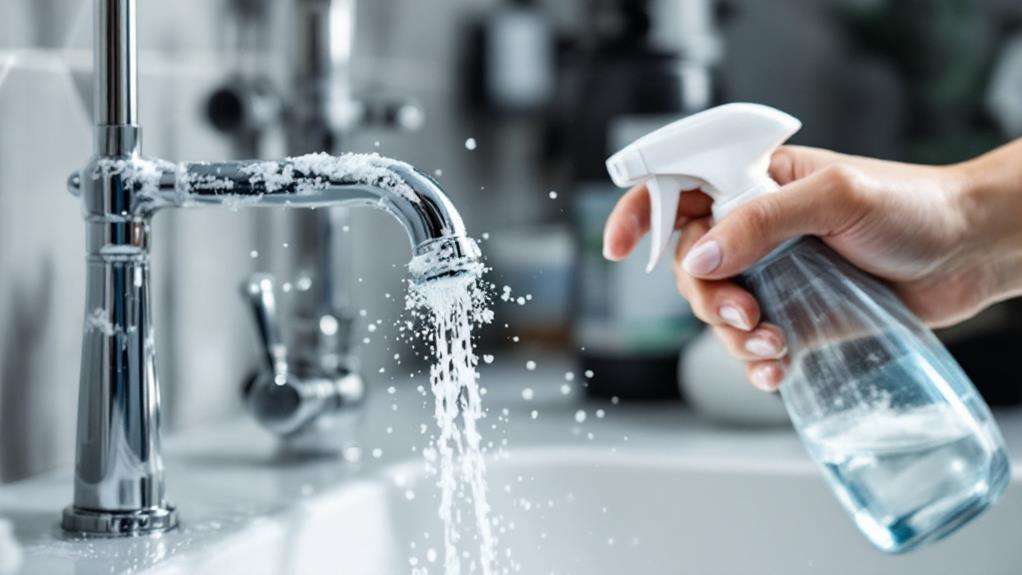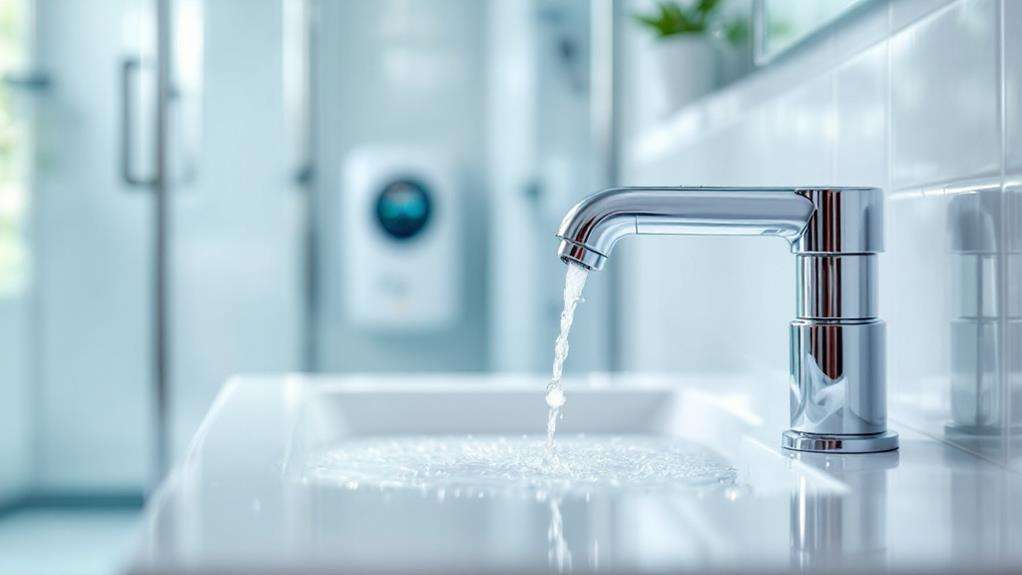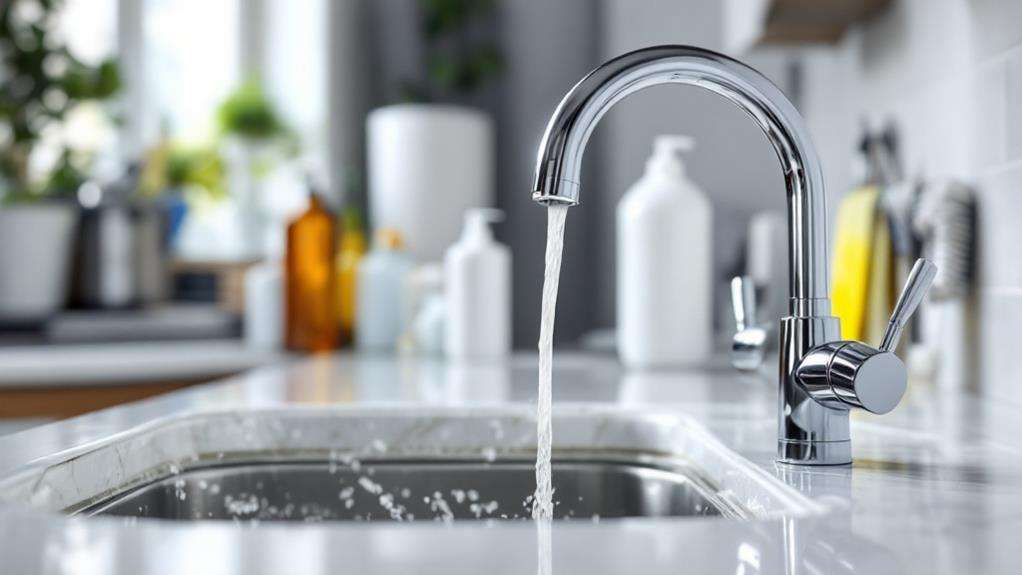How to Remove Hard Water Stains With Effective Water Treatment Solutions
To remove hard water stains, you'll need a combination of effective cleaning techniques and water treatment solutions. Start by using natural cleaners like vinegar or lemon juice to dissolve mineral deposits. For tougher stains, try commercial products specifically designed for hard water removal. Don't forget to scrub with a brush or pumice stone to break down stubborn buildup. To prevent future stains, consider installing a water softening system or whole-house filtration. These systems remove excess minerals from your water supply, reducing the likelihood of stain formation. Regular maintenance and wiping down surfaces after use will help keep your fixtures and appliances stain-free. Uncover more ways to combat hard water stains and improve your home's water quality.
Understanding Hard Water Stains
Hard water stains, the bane of many homeowners, are more than just unsightly marks on your surfaces. These persistent blemishes are actually mineral deposits, primarily composed of calcium and magnesium, that form when water evaporates. The culprit behind these stains is water hardness, which refers to the concentration of dissolved minerals in your water supply.
You'll typically notice hard water stains as white, gray, or brown deposits on glass, tiles, and fixtures. While they may seem harmless at first, these stains can damage surfaces over time if left untreated. That's why it's essential to remove water stains promptly to maintain the cleanliness and integrity of affected areas.
To effectively combat hard water stains, you need to understand their root cause. The minerals in hard water react with soap and detergents, reducing their cleaning effectiveness and leaving behind residue. This is where a water softener can be indispensable. By removing excess calcium and magnesium from your water, a softener helps prevent the formation of hard water stains and makes cleaning easier. Addressing the underlying water hardness issue is key to long-term prevention of these pesky mineral deposits.
Natural Cleaning Solutions
Now that you understand the nature of hard water stains, let's investigate some natural cleaning solutions to tackle them. Vinegar is a powerful natural cleaner that effectively dissolves mineral deposits causing hard water stains. You can use it alone or combine it with baking soda for enhanced cleaning power. The fizzing reaction created when these two ingredients mix helps lift stubborn stains without harsh chemicals.
For delicate surfaces like glass and ceramics, hydrogen peroxide is a gentle yet effective option. Simply spray it on the affected area and let it sit before wiping clean. Another natural solution is lemon juice, which contains citric acid that breaks down mineral deposits while leaving a fresh scent.
When using these natural cleaners, it's important to allow them time to work on the stains. Apply your chosen solution, let it sit for a few minutes, then scrub gently with a soft cloth or sponge. For tougher stains, you may need to repeat the process or leave the cleaner on for longer. Remember, consistent cleaning and prevention are key to keeping hard water stains at bay.
Commercial Stain Removal Products

While natural solutions are effective, there are several commercial products designed specifically for hard water stain removal. These cleaning products are formulated to effectively remove stubborn hard water stains and calcium deposits from various surfaces. When selecting a stain remover, look for options that target mineral buildup and scale.
To use commercial cleaners, start by applying the product directly to the affected area using a spray bottle. Let it sit for 15 minutes to allow the active ingredients to penetrate the stains. For best results, use a scrub brush to agitate the solution and break down the mineral deposits. Rinse thoroughly with clean water and dry the surface to reveal the cleaned area.
Some popular commercial options for cleaning hard water stains include CLR, Lime-A-Way, and The Works. These products are specially formulated to dissolve mineral buildup and can be particularly effective on tough stains that natural solutions struggle to remove. Always follow the manufacturer's instructions and safety precautions when using these products, as they may contain strong chemicals that require proper handling and ventilation.
Mechanical Removal Techniques
Beyond chemical solutions, mechanical removal techniques offer a hands-on approach to tackling hard water stains. You'll find that scrubbing the affected area with a stiff-bristled brush can effectively break down mineral deposits, physically removing the stains. For more stubborn buildup, try using a pumice stone or other abrasive cleaning tool to scrape away the stains without damaging the underlying surface.
Baking soda can serve as a mild abrasive when applied to the stain and scrubbed with a damp cloth or sponge. This method helps lift and remove hard water deposits through physical agitation. For particularly tough stains, soak paper towels in vinegar and place them over the affected area. Let them sit for an extended period to soften and dissolve the mineral deposits, making mechanical removal easier.
If you're dealing with larger areas or more persistent stains, consider using a steam cleaner or pressure washer. These tools apply high-pressure water and heat to dislodge and flush away hard water stains from surfaces. By combining these mechanical removal techniques, you'll be well-equipped to tackle even the most stubborn hard water stains.
Prevention Strategies

Prevention is the key to keeping hard water stains at bay. To effectively prevent hard water stains, you'll need to address the root cause: the hardness of your home water. Installing a water softener is one of the best water solutions to combat this issue. A water softener removes minerals like calcium and magnesium from your water as it travels through your plumbing system, resulting in soft water that's less likely to leave stains.
If you're not ready to invest in a water softener, there are DIY solutions you can try. Regularly wiping down surfaces after water use can help prevent mineral buildup. You can also apply a protective coating to fixtures and appliances to make it harder for minerals to stick. Another option is to use a water filter on your faucets or showerheads to reduce mineral content.
For a detailed approach, consider whole-house filtration systems. These treat all the water entering your home, ensuring that every tap delivers softer water. Remember, preventing hard water stains is often easier and more cost-effective than removing them later.
Water Softening Systems
Water softening systems are the gold standard for tackling hard water problems. These systems effectively remove minerals like calcium and magnesium from your water supply, preventing the formation of hard water stains on surfaces throughout your home. By exchanging hard water minerals with sodium or potassium ions, a water softener produces softer water that won't leave behind those pesky mineral deposits.
Installing a whole-house water softener offers numerous benefits:
- Reduced soap scum buildup
- Cleaner, brighter laundry
- Extended lifespan of appliances
- Less frequent cleaning of fixtures and surfaces
You'll notice a significant improvement in your home's water quality once you've installed a water softening system. Say goodbye to stubborn hard water stains and hello to easier cleaning and maintenance. However, it's essential to remember that regular maintenance and regeneration of the water softener's resin bed are necessary to sustain its continued effectiveness.
Long-Term Maintenance Tips

For long-term success in combating hard water stains, you'll need to adopt a proactive approach to maintenance. Start by implementing regular cleaning routines and preventive maintenance measures to minimize hard water build-up over time. Consider installing a water softener system, which effectively reduces mineral content and prevents stains from forming.
Properly maintaining your fixtures, surfaces, and appliances will extend the time between thorough cleaning sessions. After showering or cleaning, use a squeegee to remove excess water and prevent spotting. This simple habit can vastly reduce stain formation.
Incorporate periodic deep cleaning into your maintenance schedule to address any persistent stains that may develop. Combine this with ongoing water treatment solutions for all-encompassing stain prevention.
